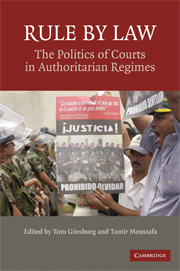Book contents
- Frontmatter
- Contents
- Contributors
- Introduction: The Functions of Courts in Authoritarian Politics
- 1 Of Judges and Generals: Security Courts under Authoritarian Regimes in Argentina, Brazil, and Chile
- 2 Administrative Law and the Judicial Control of Agents in Authoritarian Regimes
- 3 Singapore: The Exception That Proves Rules Matter
- 4 Agents of Anti-Politics: Courts in Pinochet's Chile
- 5 Law and Resistance in Authoritarian States: The Judicialization of Politics in Egypt
- 6 Courts Out of Context: Authoritarian Sources of Judicial Failure in Chile (1973–1990) and Argentina (1976–1983)
- 7 Enforcing the Autocratic Political Order and the Role of Courts: The Case of Mexico
- 8 The Institutional Diffusion of Courts in China: Evidence from Survey Data
- 9 Building Judicial Independence in Semi-Democracies: Uganda and Zimbabwe
- 10 Judicial Power in Authoritarian States: The Russian Experience
- 11 Courts in Semi-Democratic/Authoritarian Regimes: The Judicialization of Turkish (and Iranian) Politics
- 12 Judicial Systems and Economic Development
- 13 Courts in Authoritarian Regimes
- References
- Index
4 - Agents of Anti-Politics: Courts in Pinochet's Chile
Published online by Cambridge University Press: 05 June 2012
- Frontmatter
- Contents
- Contributors
- Introduction: The Functions of Courts in Authoritarian Politics
- 1 Of Judges and Generals: Security Courts under Authoritarian Regimes in Argentina, Brazil, and Chile
- 2 Administrative Law and the Judicial Control of Agents in Authoritarian Regimes
- 3 Singapore: The Exception That Proves Rules Matter
- 4 Agents of Anti-Politics: Courts in Pinochet's Chile
- 5 Law and Resistance in Authoritarian States: The Judicialization of Politics in Egypt
- 6 Courts Out of Context: Authoritarian Sources of Judicial Failure in Chile (1973–1990) and Argentina (1976–1983)
- 7 Enforcing the Autocratic Political Order and the Role of Courts: The Case of Mexico
- 8 The Institutional Diffusion of Courts in China: Evidence from Survey Data
- 9 Building Judicial Independence in Semi-Democracies: Uganda and Zimbabwe
- 10 Judicial Power in Authoritarian States: The Russian Experience
- 11 Courts in Semi-Democratic/Authoritarian Regimes: The Judicialization of Turkish (and Iranian) Politics
- 12 Judicial Systems and Economic Development
- 13 Courts in Authoritarian Regimes
- References
- Index
Summary
INTRODUCTION
On September 11, 1973, General Augusto Pinochet helped lead the overthrow of one of Latin America's most democratic regimes. As part of the coup, Chile's military leaders bombed the presidential palace, shut down the Congress, banned political parties, and purged the state bureaucracy. They left the courts, however, completely untouched. Pledging their commitment to judicial independence, the generals kept intact the long-standing system of judicial appointment, evaluation, discipline, and promotion, which placed primary control in the hands of the Supreme Court, and refrained from dictating or otherwise manipulating judicial decisions. The 1925 constitution, which provided a host of liberal and democratic guarantees, remained formally in effect, though the junta gradually (and sometimes retroactively or secretly) supplanted many of these with their own decree-laws, and later, their own constitution. Throughout, the military government insisted it was acting in the name of the rule of law, though its approach violated the most basic principles of that concept.
Despite the formal independence they enjoyed, however, and the resources that the country's legal texts and traditions provided them, Chilean courts never sought to challenge the undemocratic, illiberal, and antilegal policies of the military government. Indeed, they cooperated fully with the authoritarian regime, granting it a mantle of legitimacy not only during the seventeen years of dictatorship, but well beyond the transition back to formal democracy in 1990 (see Hilbink 2007: ch. 5).
- Type
- Chapter
- Information
- Rule by LawThe Politics of Courts in Authoritarian Regimes, pp. 102 - 131Publisher: Cambridge University PressPrint publication year: 2008
- 16
- Cited by

